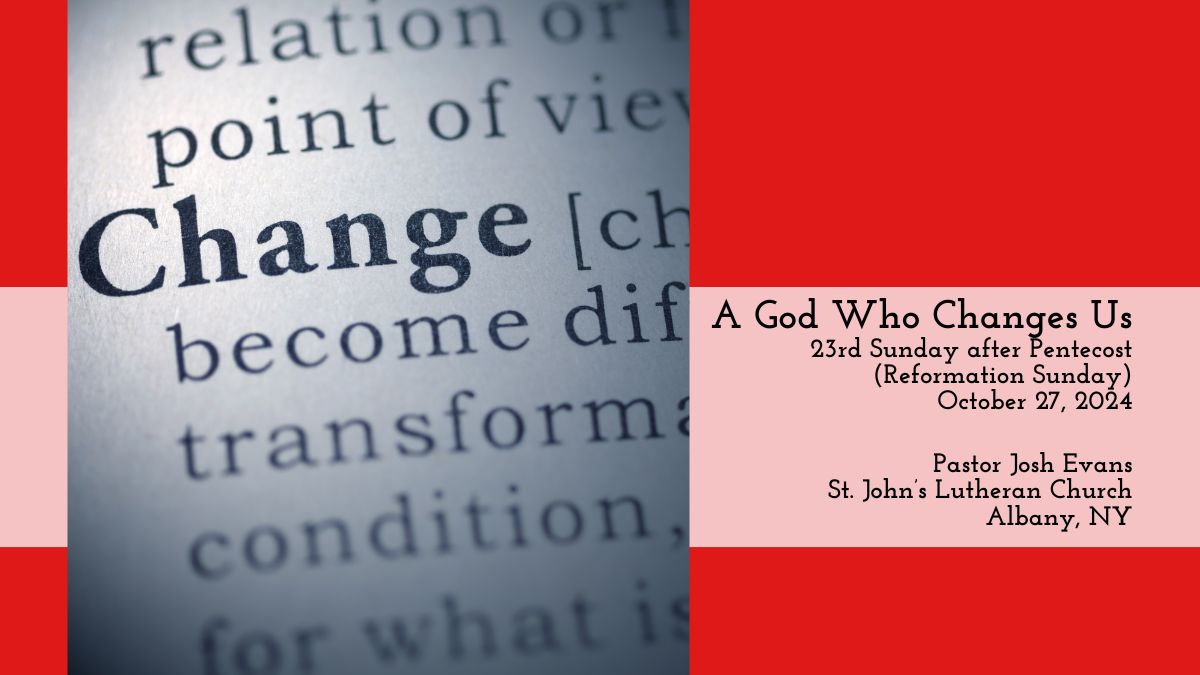St. John’s Lutheran Church
27 October 2024 + Lectionary 30b (Reformation)
Mark 10:46-52
Rev. Josh Evans
I can’t help but wonder
how long he had been sitting there.
I can’t help but wonder
what stories, or news, or town gossip he had heard,
just sitting there –
ignored and out of sight…
but certainly not out of earshot.
This beggar,
this nobody,
except curiously –
he gets a name.
Out of the dozens of healing stories in the gospels,
in only two of them does the person healed
get a name.
There’s Lazarus (that one seems like kind of a big deal),
and then there’s Bartimaeus.
Bar-Timaeus.
Son of Timaeus.
Son of “the Honorable.”
Or more appropriately,
in a bit of Aramaic wordplay,
“Son of “the Unclean.”
Or maybe both –
and Mark would have us find a person of honor,
someone of significance,
someone worth paying attention to,
where we’d least expect them.
I wonder how he’d found out about Jesus.
I wonder how he knew enough to know that Jesus was someone special,
that it was this Jesus passing by,
that compels him to shout out:
“Jesus, Son of David, have mercy on me!”
A politically and religiously charged title if ever there were one,
coming from the one and only person in all of Mark’s gospel to utter it –
unashamedly proclaiming Jesus as the Messiah.
I wonder how he felt,
being told to “be quiet” and shut up.
I wonder how it felt
to even more loudly and defiantly shout out the second time:
“Son of David, have mercy on me!”
I wonder how he felt in that split second of dead silence –
did it feel like an eternity? –
when Jesus. Stood. Still.
…before asking the crowd to call him over.
I wonder how he felt
hearing those words from people who never before acknowledged his existence,
now urging him: “Take heart; get up, he is calling you!”
(I wonder if he thought it was a trick, too good to be true…)
I wonder what it felt like
when he was asked by Jesus what he wants,
instead of what someone else thought he wanted.
I wonder what it was like
to immediately see again.
“Again” – implying that he had seen before –
but how long ago?
No wonder
he immediately follows Jesus on the way,
disregarding Jesus’ instructions to “go”
as easily as he had thrown off his cloak
and sprung to his feet moments before.
There’s no further mention of Bartimaeus
in Mark’s gospel – or anywhere else –}
which means that he might have disappeared into the crowd
as Jesus triumphantly enters into Jerusalem in the very next scene.
Or maybe he kept following.
Maybe he was there until the end.
Maybe he stayed in Jerusalem
and was there in the crowd on the day of Pentecost.
Maybe he was in the room where it happened,
when the Holy Spirit showed up in tongues of fire.
Maybe.
For all we don’t know about Bartimaeus,
at least one thing is clear:
Bartimaeus was changed.
Having been so changed,
he couldn’t help but want to be a part of this –
whatever this was.
Having been so changed,
he wanted to be a part of the movement that was doing the changing –
the movement that was transforming everyone and everything around,
the movement that was drawing a large crowd from the Galilean countryside,
right into the heart of the holy city itself.
Bartimaeus’ faith had made him well.
And Bartimaeus’ faith –
his utter and complete confidence in what Jesus could do,
his daring courage that wouldn’t be quiet,
that wouldn’t take “no” for an answer –
compels him to follow
and to take his place as a disciple.
All throughout this central section of Mark’s gospel,
in these last three chapters,
Jesus has been teaching his disciples
what it means to be a disciple –
and where it’s going to lead.
Bartimaeus doesn’t try to get in Jesus’ way, like Peter.
He doesn’t ask self-serving questions about greatness and glory,
like James and John.
He doesn’t for a second let what few possessions he has get in the way,
like the rich man,
but instead throws off his cloak, quite possibly the only thing he owned,
without a second thought.
Bartimaeus shows us a kind of faith that is bold,
a faith that is courageous,
a faith that cries out, and cries out even more loudly,
a faith that compels him to follow –
because he knows and trusts in what Jesus is capable of:
“Take heart; get up, he is calling you!”
Bartimaeus’ faith is a reformation kind of faith –
a faith in a God who changes us …
but doesn’t stop there.
Here is “a faith active through love,”
as a particular theologian by the name of Martin Luther
(maybe you’ve heard of him?) might say.
Here is a faith that compels us to love our neighbor
as God through Christ has so loved us –
a faith that compels us to change the world
as God, by God’s grace, has changed us.
With the faith of Bartimaeus,
we cry out for
mercy,
justice,
and peace.
With the faith of the reformers of every time and place,
who seek to make the church a more inclusive, more love-filled place,
we speak out (and vote!)
against unjust systems
that oppress God’s people.
With the faith of the communion of saints,
those around us and those before us,
we keep on following
on the way –
trusting in the grace of a God
who calls us and sees us –
a God who changes us
so that we can change the world.



